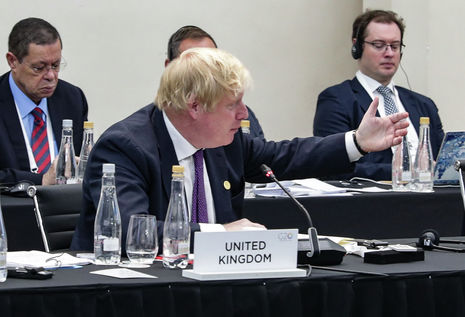The West has a hypocrisy problem
Jacob Lewis writes that both social and traditional media are amplifying a fixation on the hypocrisy of political actors, to the detriment of public discourse

Western media has an obsession with hypocrisy. Social media has only served to facilitate this behaviour, allowing pools of potential judges to grow ever larger as more people gain access to archival information. From pointing at climate activists using non-degradable plastic banners, or ministerial conduct appearing to contradict current policy, to smaller-scale Twitter spats involving the hasty digging-up of decade-old posts, there’s no end to the petty depths to which people will sink to prove that someone is a hypocrite, and therefore unworthy to make a point. Scrutiny is necessary for maintaining standards of publicly-elected officials, but to what lengths should people go to hammer the point home? And in some cases, does it allow a larger problem to remain unchallenged?
Firstly, a working definition. Do as I say, not as I do. A hypocrite may take the moral high ground and their actions will contradict their statements. They may lecture you for not recycling, before indiscriminately throwing everything in the rubbish. They act in a way that opposes their stated beliefs or values. And let’s be clear: we all do this; at least, everyone I can remember has, and it’s not necessarily damaging or dangerous or concerning behaviour. People also love calling out others for hypocrisy. This behaviour is delightfully human – but although it may bring some small petty happiness and feeling of vindication for the accuser (and can be pretty funny sometimes), its problems do not mix well with access to the internet.
“Western media has an obsession with hypocrisy”
Recently there has been an increase in both surveillance of public figures, and their presence on social media platforms. The UK government recently suffered a barrage of accusations following a very prominent story: telling the country’s population to self-isolate, avoid social contact and remain in lockdown while doing the very opposite themselves. Reporting this hypocrisy is crucial today for maintaining standards of integrity in publicly held positions; Matt Hancock was vilified in the press for being caught flagrantly breaking lockdown rules. Johnson has thus far evaded official reprimand.
However, media outlets love to manufacture outrage. Often it can even distract from a bigger issue taking place, like the controversial Police, Crimes, Sentencing and Courts Bill progressing further through Parliament while the media was focused on outing Hancock the hypocrite. How much of this was eventually justified, how much it obscured other issues, and how much it affected public attention is ultimately a matter of personal opinion.
A large part of the problem lies in editorial decisions over allocating space in newspapers. In the UK, this is ultimately down to just a few individuals who control print publications. Online, where most people now find news, is a much more complicated story. The internet is incredibly problematic when it comes to publication permissions; anyone is allowed to publish basically anything they like on social media, and there are barely any repercussions for that turning out to be misinformation, the result of which incurs substantial harm.
“It is easy to make a leap of association between an ideology and an individual”
People are so hyper-aware of the failings of public figures because they do not view them in the same way as people they know personally. Public figures are generally known for one or two main reasons, and are consequently polarising due to being represented in a one-dimensional way. The chances are that your opinion of anyone you’re close to is far more nuanced than a simple like or dislike. While this binary view of public figures is not a recent phenomenon, it has certainly been exacerbated by the ability to view curated fragments of their lives. On social media, it is easy to make a leap of association between an ideology and an individual. This results in a minority of supporters of a cause being loudly criticised by news crews if their individual actions are deemed to be hypocritical - often undermining an entire group trying to make a serious point. A recent example: Extinction Rebellion protesters leaving plastic litter and waste after a march, letting reporters use their conduct to distract from the organisation’s aims.
This discourse has affected religious discussion too, as political arguments on social media become inextricably linked, especially in the US, with religion. In particular, abortion and women’s rights are frequently discussed in the context of Christian beliefs. There is a common narrative that Republicans will fight tooth and nail to protect rights of the unborn child due to ‘family’ values (often a dog-whistle term to indicate Christian association), then seemingly fail to provide welfare once it is born. This version of hypocrisy is discussed with about as much subtlety as a steamroller with a siren; arguments between political commentators often roll into this territory. Here it is a bit easier to see why someone might need to point out hypocrisy and make it a bigger issue – there is too much at stake to let it slide out of the discussion.
Ultimately, political issues are decided democratically – and a large part of the electorate now chooses based on personality, not policy; this is reflected in what people read and write online, and how media outlets conduct themselves. Decisions as important as voting in a general election should be based on policy rather than the people presenting it. The integrity of politicians is important, and always will be – but this comes down to the importance of issues, and unfortunately it also comes down to applying your own values to a situation. As ever, critical thinking is vital to how we interact and engage with our news sources and with public life.
 News / Eight Cambridge researchers awarded €17m in ERC research grants27 December 2025
News / Eight Cambridge researchers awarded €17m in ERC research grants27 December 2025 News / Downing investigates ‘mysterious’ underground burial vault 29 December 2025
News / Downing investigates ‘mysterious’ underground burial vault 29 December 2025 Lifestyle / Ask Auntie Alice29 December 2025
Lifestyle / Ask Auntie Alice29 December 2025 Sport / Hard work, heartbreak and hope: international gymnast Maddie Marshall’s journey 29 December 2025
Sport / Hard work, heartbreak and hope: international gymnast Maddie Marshall’s journey 29 December 2025 Interviews / Meet Juan Michel, Cambridge’s multilingual musician29 December 2025
Interviews / Meet Juan Michel, Cambridge’s multilingual musician29 December 2025










